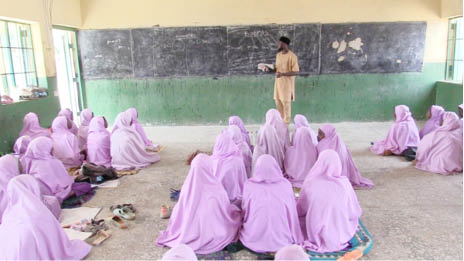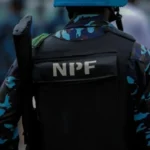Lack of teachers in the existing public schools in Tsakuwa community of Dawakin Kudu Local Government Area of Kano State is fast becoming a case to worry about for residents of the area.
Daily Trust had visited Tsakuwa and observed that it takes the extra efforts of the community members to keep the pedal of educational pursuit on a steady ride.
The community, which shares boundaries with Kumbotso and Wudil local government areas, located few kilometres from Kano metropolis, is in dire need of adequate teachers to bridge the existing gaps posing a challenge to the education of young ones.
The community is one of the biggest and busiest places in the local government area, and has a population of over 23,000 people who are largely farmers and businessmen.
Known for hosting countless Islamic teachers as it is blessed with knowledgeable individuals of high repute, knowledge seekers from far and wide troop to the community to learn from one alaramma or another.
However, for years now, about 10 public schools in the area have been battling with inadequate manpower and unconducive learning environment. Well-to-do individuals among the residents task themselves through an association to pay voluntary and temporary teachers to teach their children in the schools.
Speaking on the development, Abdullahi Yusuf Wagari who is the chairman of the education committee at Tsakuwa Mufarka – an association which aims to drive positive development in the community, said despite the efforts of the association, it is still hard to cope as they currently have 27 people on their payroll receiving the sum of N10,000 each monthly.
“Education is at the forefront in every society that wants to progress. We grew up to see a dilapidated state of education here and we are working to address the problem.
“At first, we met three schools – Government Senior Secondary School, Government Girls Senior Secondary School and Central Primary School which is the oldest and only primary with the highest number of enrolments.
“At the community level, we founded another school with five classrooms, a toilet and teachers office. We wrote to the authorities demanding another primary school and we got Alhaji Danjummai Special Primary School, Kofar Kudu. That school was given four teachers and we provided additional five, making nine.
“We looked at the other schools and saw that one of the major problems is lack of teachers and learning materials which we provided. The Boys school was given six temporary and volunteer teachers while the girls school was given seven teachers all being paid N10,000 each.
“There is also Zinatul Islamiyya primary school which was in a dilapidated state. We renovated it and gave them teachers also. They have at least 500 students but only three teachers. So, we gave them additional six.
“With these interventions, the level of enrolment was still high so we had to establish another Model primary school with the support of a lawmaker who constructed for us a block of six classrooms, toilet, staff room and principal’s office after we provided the land. Four teachers were sent there which was inadequate so we provided three more, making a total of seven.
“When junior and senior secondary schools were separated by the government, another school was gotten with three teachers and we provided three more.
“Now, this year alone, we’ve received requests from these schools because there is a high rate of enrolment so they are facing shortage of teachers. We looked into it and found out that it is true. So, this week alone, we have recruited additional 10 volunteer teachers. Four were posted to GGASS Tsakuwa to teach mathematics, physics, chemistry and biology while another school also got four. Model has received two more currently.
“This is the main challenge we are facing in terms of education. We now have 27 volunteer teachers on our payroll while we still count scarcity of teachers amounting to more than 10.”
On learning materials, he added that only one school in Tsakuwa has seats with the rest having no single seat for any student or pupil as they sit on the bare floor to take lessons.
Ibrahim Alhaji Hamisu is one of the volunteer teachers at Government Girls Arabia Secondary School (GGASS) Tsakuwa. He spoke on why he volunteered to teach.
“I agreed to teach in this capacity despite the low pay as my contribution in assisting our community.
“They are our children, brothers and sisters so we need to help them. If we don’t do it, nobody will do it for us as you can see, but we still hope that things will get better.
“I want to teach the younger generation to always assist in solving problems whenever the need arises. I want them to also be helpers in the future and I believe that if they are helped, they will also do the same for others in the future in one way or the other.
“The most important thing to note is that if we can keep up with initiatives like this, most of our problems will be solved by ourselves without waiting for the government to do it for us despite the challenges. Our communities will develop that way.
“Education is the bedrock and foundation of good tidings and the absence of education fuels almost all antisocial vices. We don’t want that and we are committed to fighting that,” he said.
Also speaking, Abdullahi Danladi, an undergraduate student of the Bayero University Kano (BUK) who teaches mathematics as a volunteer staff, said he deemed it fit to support the initiative to help and encourage the younger ones not minding the meagre pay.
“We are being paid just N10,000 but even without the pay, we will still do it because it’s our elder brothers’ and parents’ initiative. We have no choice than to key in also.
“I am moved and motivated, ever ready to serve our community because the students are our sisters, brothers, relatives and younger ones, so there’s the need to help them.
“We just hope this association maintains the effort it is putting in to save our society as we also key in to support.”
However, some parents expressed their lack of faith in the government regarding the education of their children and wards.
Sani Bala is a father of four children studying across two schools in Tsakuwa. He said, “I feel disappointed taking my children to school and still having to go through an association to pay the teachers that will teach my children. It’s very disappointing.
“The government needs to do more honestly because it’s a serious case that it should deal with. We are doing this because we can’t afford to leave our children to stay uneducated. We have complained but to no avail that’s why we are doing this now.”
Speaking on the steps taken in reaching out to the authorities concerned, the chairman of the education committee, Abdullahi Yusuf Wagari, revealed that being fed up with writing formally and informally made them to resort to self help and ignore the government, while still keeping hope.
“We have done our best in reaching out to the Local Education Authority (LEA). We have gone there times without number. We have written formally and informally severally.
“We also reached out to higher authorities severally until we had no choice than to solve our problem ourselves. We can’t afford to watch or allow our children grow up without education for the benefit of our society.”

 Join Daily Trust WhatsApp Community For Quick Access To News and Happenings Around You.
Join Daily Trust WhatsApp Community For Quick Access To News and Happenings Around You.


